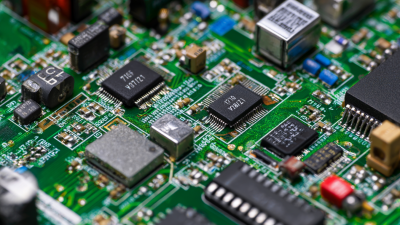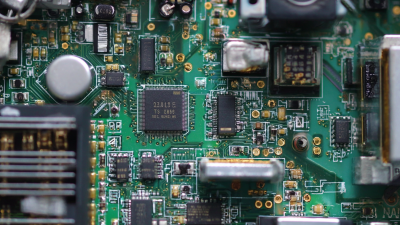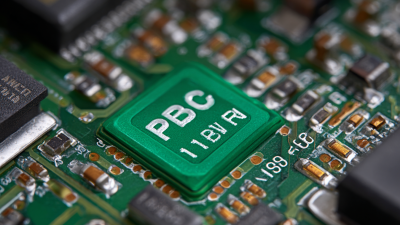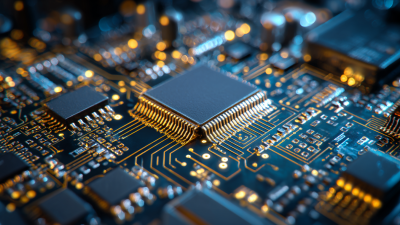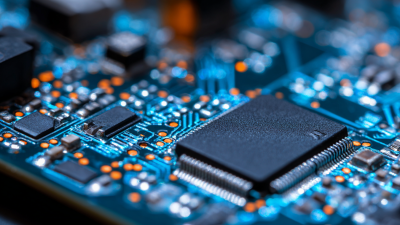In today's rapidly advancing technological landscape, the role of Pcb Printed Circuit Boards (PCBs) has become increasingly pivotal in driving innovation across the electronics sector. According to a report by IPC, the global PCB market is projected to reach USD 78.57 billion by 2024, growing at a CAGR of 3.5% from 2020. This growth underscores the importance of efficiency improvements in PCB production and design, which can lead to significant enhancements in electronic devices. With the integration of advanced manufacturing techniques and materials, recent studies have shown that PCBs can achieve efficiency gains of up to 25%. This leap in efficiency not only facilitates the miniaturization of complex electronic systems but also contributes to sustainability efforts by reducing material waste. As companies strive to meet the demand for more powerful and compact devices, optimizing PCB technology is crucial for remaining competitive in the ever-evolving market.

The evolution of printed circuit boards (PCBs) has been pivotal in shaping modern electronics, playing a crucial role in the advancement of technology across various sectors. Modern PCBs are designed with a focus on efficiency, miniaturization, and performance, allowing for the development of smaller, faster, and more powerful devices. Innovations such as high-density interconnect (HDI) technology and flexible circuits enable manufacturers to push the boundaries of electronic design, facilitating the creation of compact and sophisticated gadgets that seamlessly integrate into our daily lives.
Moreover, the integration of advanced materials and manufacturing techniques enhances the reliability and efficiency of PCBs, contributing to significant performance gains. As industries increasingly demand energy-efficient solutions, PCBs equipped with innovative features, like thermal management systems and signal integrity enhancements, are essential for optimizing the functionality of electronic devices. This not only drives innovation but also aligns with global sustainability efforts, ensuring that the electronics sector can adapt to the challenges of tomorrow while maintaining competitive advantages in efficiency and performance.
The trend of efficiency optimization in printed circuit boards (PCBs) is increasingly becoming a driving force behind innovation in the electronics industry. Recent advancements highlight the substantial impact of PCB design on overall system performance, with reports indicating gains of up to 25%. This efficiency boost not only enhances the performance of processors but also optimizes power consumption, which is crucial in today’s resource-conscious landscape. For instance, the launch of specialized motherboards designed for advanced processors showcases how tailored PCB designs can lead to significant improvements in gaming performance, resonating with the 25% increase seen in performance metrics.
**Tips:** When designing PCBs, consider integrating multi-physics simulations to anticipate performance improvements. These tools can help engineers understand the thermal and electrical behavior of PCB designs in great detail, ultimately leading to more efficient prototypes.
As the industry moves towards more complex electronic systems, incorporating AI-driven design strategies can further optimize PCB layout and functionality. Industry trends suggest that leveraging sophisticated design software can result in reduced time-to-market and higher reliability. Ensuring that your PCB is not just a foundation for your electronics but a vital component of your product's performance can make all the difference in a competitive market.
This chart demonstrates the performance efficiency gains achieved through the use of printed circuit boards (PCBs) in modern electronic devices, showcasing a 25% improvement in various metrics such as power consumption and processing speed.
As the electronics industry pushes the boundaries of innovation, the role of printed circuit boards (PCBs) is becoming increasingly critical. Emerging technologies such as 5G, Internet of Things (IoT), and autonomous vehicles are driving the need for advanced PCB design and production methods. According to a report by MarketsandMarkets, the global PCB market is projected to reach $85.2 billion by 2025, reflecting an annual growth rate of 3.9%. This growth is primarily fueled by the demand for more compact and efficient electronic devices, which require sophisticated PCB designs that can accommodate higher performance specifications.
Innovative techniques such as embedded components, multilayer structures, and advanced materials are revolutionizing PCB manufacturing. With these technologies, manufacturers can achieve up to 25% efficiency gains in power consumption and thermal management. For instance, the use of high-frequency materials can significantly enhance signal integrity and reduce losses in communication devices. Additionally, the advent of AI and machine learning in design processes is optimizing PCB layouts, enhancing production efficiency, and reducing time-to-market. As these technologies continue to evolve, the future of PCB design and production looks promising, setting the stage for unprecedented advancements in the electronics sector.
The relentless pursuit of sustainability in electronics has led to significant advancements in eco-friendly PCB (Printed Circuit Board) solutions, reshaping how the industry views environmental responsibility. Manufacturers are increasingly adopting materials that reduce waste and promote recycling, such as biodegradable substrates and lead-free solder. These innovations not only help in minimizing the ecological footprint of electronic devices but also address the growing consumer demand for responsible production practices.

Moreover, the integration of energy-efficient manufacturing processes is contributing to a more sustainable lifecycle for PCBs. Techniques such as additive manufacturing and precision etching reduce excess material waste and improve overall energy efficiency during production. These advancements not only align with global sustainability goals but also provide manufacturers with competitive advantages, allowing for greater innovation and responsiveness to market demands. As the electronics industry evolves, eco-friendly PCB solutions are proving to be pivotal in crafting a greener future.
The evolution of printed circuit board (PCB) technology has significantly shaped the landscape of the consumer electronics market. According to a report from Technavio, the global PCB market is expected to grow by $15.61 billion during 2021-2025, driven primarily by the rising demand for consumer electronics. This growth is largely attributed to advancements in PCB development, which have led to increased efficiency and miniaturization of electronic components, enabling manufacturers to produce smaller, more powerful devices.

Furthermore, a study by IPC found that the latest PCB innovations can enhance operational efficiency by up to 25%, allowing companies to reduce manufacturing costs while improving product performance. This increase in efficiency not only benefits manufacturers but also translates to consumers, who enjoy more energy-efficient and cost-effective products. As we look to the future, the continued advancement of PCB technology will undoubtedly play a crucial role in shaping market trends, influencing everything from device performance to sustainability initiatives within the consumer electronics industry. With consumers increasingly demanding smarter and more efficient products, the importance of PCB development in driving innovation cannot be overstated.
